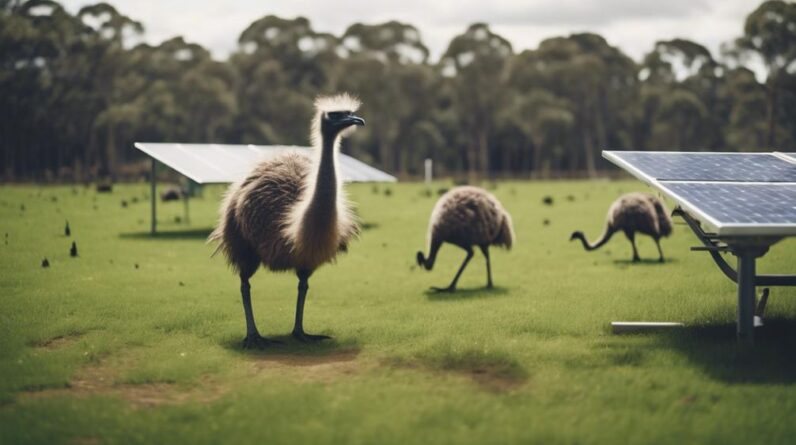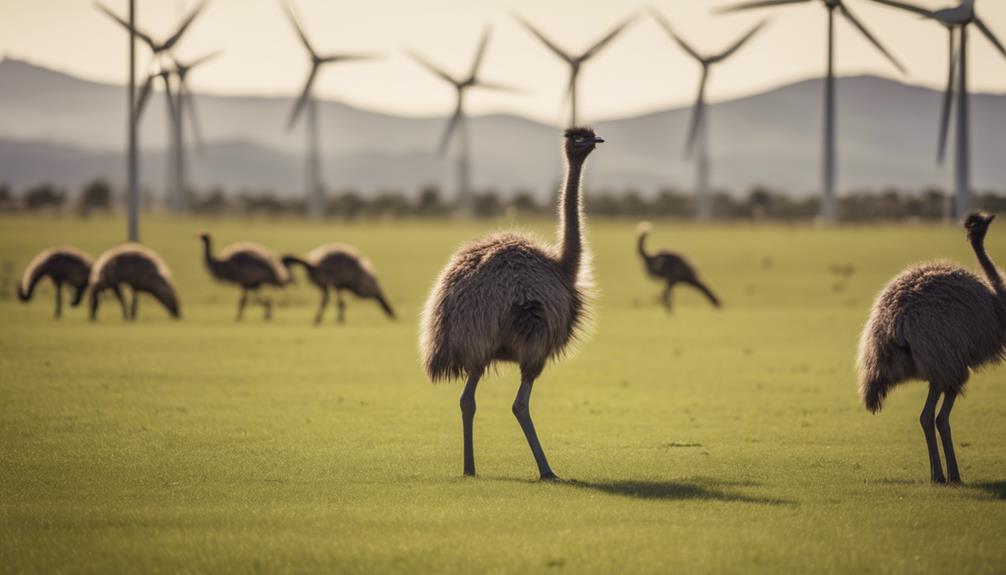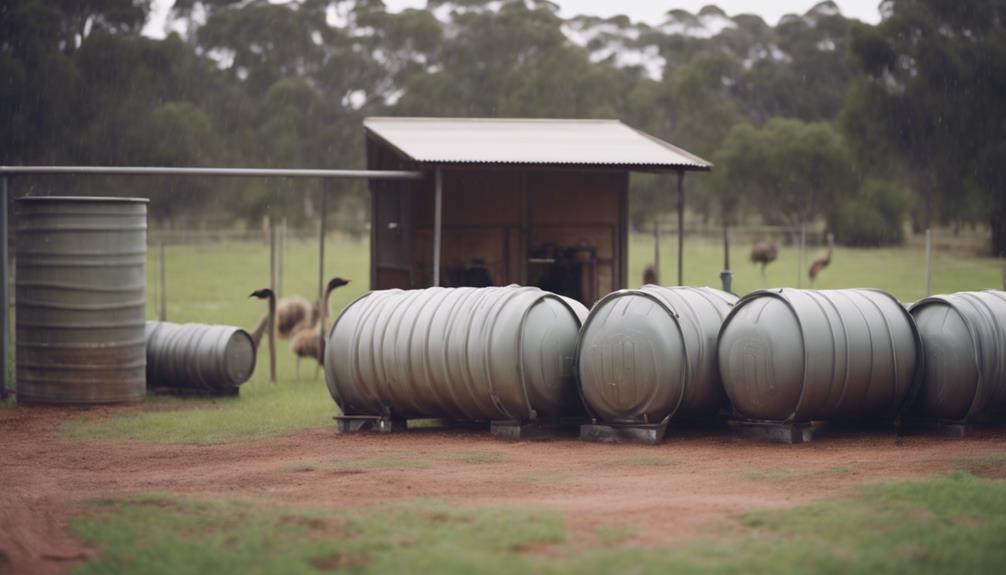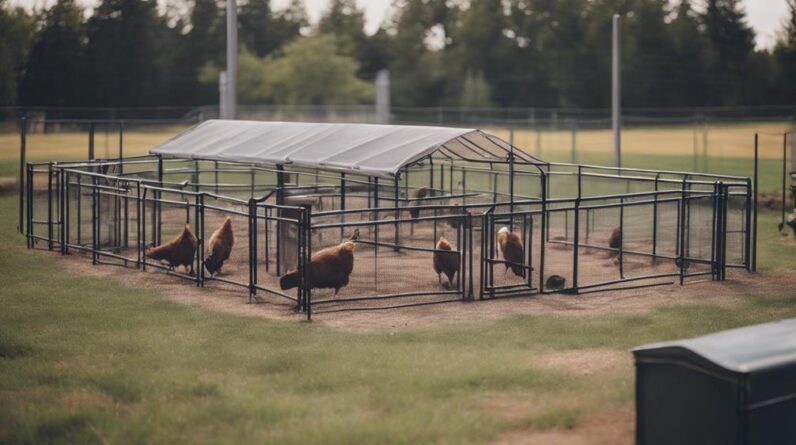
You might have concerns about the feasibility of implementing sustainable practices in emu farming, considering the complexities of the agricultural industry. However, by incorporating innovative methods and strategic planning, sustainable emu farming can not only be achievable but also highly beneficial for both the environment and the industry.
With a focus on ethical breeding, habitat preservation, waste management, and more, the impact of sustainable practices in emu farming goes beyond just the farm gates. Discover how these practices are reshaping the future of emu farming and paving the way for a more environmentally conscious approach.
Key Takeaways
- Reduced environmental impact and improved animal welfare through rotational grazing.
- Preservation of habitats and biodiversity for emus and wildlife.
- Efficient resource management with waste reduction and water conservation.
- Implementation of sustainable feed practices to meet market demand and promote eco-labeling.
Benefits of Sustainable Emu Farming

What're the key advantages of practicing sustainable emu farming? Sustainable emu farming offers significant benefits for both the environment and animal welfare. By adopting sustainable practices, such as rotational grazing and natural feed sources, emu farmers can reduce the environmental impact of their operations. These methods help preserve soil quality, promote biodiversity, and minimize pollution, leading to a more sustainable ecosystem.
In terms of animal welfare, sustainable emu farming prioritizes the well-being of the emus. Providing ample space for the birds to roam and ensuring access to natural food sources not only improves their quality of life but also results in healthier and more robust animals. Emus raised in sustainable environments exhibit lower stress levels, reduced instances of disease, and overall better physical condition.
Ethical Breeding Techniques
To ensure the ethical breeding of emus, employing modern genetic selection methods is crucial for enhancing desirable traits while maintaining genetic diversity. Breeding ethics and animal welfare are at the forefront of responsible emu farming practices. By utilizing technologies such as DNA testing and pedigree analysis, farmers can make informed decisions to prevent inbreeding and promote healthier offspring. Ethical breeding techniques also involve providing proper nutrition, adequate living conditions, and access to veterinary care for the emus. Monitoring the animals' well-being and behavior is essential in ensuring that they aren't under undue stress during the breeding process.
Genetic diversity plays a vital role in the long-term sustainability of emu populations. By selecting breeding pairs carefully and considering factors beyond just physical characteristics, such as temperament and reproductive health, farmers can contribute to the overall health and resilience of the emu population. Prioritizing breeding ethics and animal welfare not only benefits the individual emus but also supports the industry as a whole by fostering a positive reputation among consumers and stakeholders.
Natural Habitat Preservation

Preserving the natural habitat of emus is essential for ensuring their well-being and promoting sustainable farming practices. To achieve this, consider the following strategies:
- Wildlife Corridors: Implementing wildlife corridors within and around emu farms can help maintain connectivity between different habitats, allowing emus to freely roam and ensuring genetic diversity.
- Eco Tourism: By incorporating eco-tourism activities on emu farms, you can raise awareness about the importance of preserving natural habitats while also generating additional income to support conservation efforts.
- Land Restoration and Conservation Partnerships: Engaging in land restoration projects and forming partnerships with conservation organizations can contribute to the preservation of natural habitats not only for emus but for other wildlife species as well.
Efficient Waste Management
Implementing a comprehensive waste management system is crucial for optimizing efficiency in emu farming operations. By integrating composting systems and recycling initiatives, you can significantly reduce waste and enhance sustainability on your farm.
To give you a clearer picture, here is a table showcasing the benefits of efficient waste management:
| Waste Management Benefits | Description |
|---|---|
| Composting Systems | Converts organic waste into nutrient-rich compost for soil enrichment. |
| Recycling Initiatives | Reduces the amount of waste sent to landfills, minimizing environmental impact. |
| Cost-Effectiveness | Saves money on waste disposal while creating valuable resources for the farm. |
| Sustainability | Promotes a circular economy by reusing resources and reducing environmental footprint. |
Water Conservation Strategies

Efficient waste management sets a solid foundation for your emu farm's sustainability. Now, let's explore water conservation strategies to further enhance your farm's efficiency and environmental stewardship.
When it comes to water conservation on your emu farm, adopting innovative irrigation methods and utilizing water-saving technologies can make a significant difference. Here are three key strategies to help you achieve this:
- Drip Irrigation Systems: Implementing drip irrigation systems can deliver water directly to the base of plants, reducing water wastage through evaporation or runoff.
- Rainwater Harvesting: Installing rainwater harvesting systems allows you to collect and store rainwater for later use in watering crops or providing drinking water for your emus.
- Smart Water Monitoring: Utilize smart water monitoring technologies to track water usage, detect leaks, and optimize irrigation schedules based on real-time data, ensuring efficient water utilization.
Renewable Energy Integration
Maximizing the utilization of renewable energy sources can revolutionize the sustainability and efficiency of your emu farm operations. By incorporating solar panels and wind turbines into your farm, you can significantly reduce your reliance on traditional energy sources while also cutting down operational costs.
Here's a breakdown of the benefits of integrating solar panels and wind turbines into your emu farm:
| Energy Source | Advantages | Considerations |
|——————|————————————————-|—————————————|
| Solar Panels | – Renewable energy source
- Low maintenance | – Initial cost
- Weather dependence |
| Wind Turbines | – Sustainable power generation
- Cost-effective| – Location suitability
- Noise levels|
Solar panels harness the sun's energy to provide power, offering reliability with minimal upkeep. However, the initial investment and reliance on weather conditions are factors to consider. On the other hand, wind turbines are cost-effective and sustainable but require suitable locations to maximize efficiency and may produce noise.
Integrating renewable energy sources like solar panels and wind turbines can not only reduce your environmental impact but also lead to long-term savings and increased self-sufficiency in powering your emu farm.
Biodiversity Protection Measures

To enhance the sustainability of your emu farm further, consider implementing biodiversity protection measures that not only benefit your farm but also contribute to the preservation of local ecosystems. Protecting biodiversity on your farm can lead to a more resilient environment and healthier ecosystem for your emus to thrive in. Here are some practical steps you can take:
- Wildlife Conservation: Create designated wildlife habitats on your farm to provide shelter and food sources for local species. This will encourage biodiversity and support the overall health of your ecosystem.
- Ecosystem Restoration: Implement practices like native plant restoration and wetland preservation to restore and maintain the natural balance of your farm's ecosystem. This will help in preserving the unique biodiversity of your region.
- Species Protection: Identify and protect endangered species that may inhabit your farm. By safeguarding these species, you contribute to the larger goal of species preservation and conservation.
Soil Health Improvement
Enhancing soil health is essential for the sustainability and productivity of your emu farm. By incorporating compost utilization and crop rotation, you can significantly improve the quality of your soil. Compost utilization adds organic matter to the soil, enriching it with essential nutrients and beneficial microorganisms. This leads to improved soil structure, water retention, and overall fertility. Integrate composting into your farming practices to recycle organic waste and create a nutrient-rich soil amendment.
Crop rotation is another crucial technique to enhance soil health on your emu farm. Rotating crops helps break pest and disease cycles, improves soil structure, and prevents nutrient depletion. By alternating plant families in different seasons, you can maintain soil fertility and reduce the need for synthetic fertilizers. This sustainable practice also promotes biodiversity in your fields, creating a more resilient ecosystem. Implementing crop rotation strategies tailored to your farm's specific needs can lead to increased yields and healthier soil over time. Embrace these innovative soil health improvement methods to ensure the long-term success of your emu farming venture.
Integrated Pest Management

Utilize targeted pest control strategies to safeguard your emu farm's productivity and sustainability. Implementing Integrated Pest Management (IPM) practices can help minimize the use of pesticides while effectively managing pest populations.
Here are some innovative ways to enhance pest control on your emu farm:
- Encourage Natural Predators: Introducing natural predators like beneficial insects or birds can help keep pest populations in check without the need for chemical interventions.
- Implement Biological Control Methods: Utilize biological control agents such as nematodes or bacteria to target specific pests while preserving the overall ecosystem balance.
- Crop Rotation and Companion Planting: Rotate crops and plant companion plants that naturally repel pests to reduce the likelihood of infestations and promote a healthier farm environment.
Sustainable Feed Practices
Implementing sustainable feed practices is essential for optimizing the nutritional value of emu diets while minimizing environmental impact. To achieve feed optimization, consider enhancing resource efficiency through strategic feed sourcing. Utilizing locally sourced feed ingredients can reduce transportation emissions and support local economies. Moreover, incorporating byproducts from other agricultural processes can enhance the sustainability of emu diets by reducing waste.
When selecting feed sources, prioritize those with minimal environmental impact. Look for suppliers that prioritize sustainable farming practices and offer transparency in their sourcing methods. By choosing feeds that align with these principles, you can contribute to a more environmentally friendly emu farming system.
Additionally, consider implementing feed management techniques that reduce waste and improve feed conversion rates. Monitoring feed intake and adjusting rations accordingly can help optimize nutritional delivery to emus while minimizing excess feed that may contribute to environmental burdens. By adopting these sustainable feed practices, you can promote both the health of your emus and the sustainability of your farming operations.
Carbon Footprint Reduction

To reduce the carbon footprint of your emu farming operations, prioritize sourcing feed locally and optimizing feed management techniques. By implementing these strategies, you can significantly decrease the environmental impact of your farm while also improving sustainability practices.
Here are some key actions you can take:
- Utilize renewable energy sources: Consider incorporating solar panels or wind turbines to power your farm operations. Renewable energy not only reduces reliance on fossil fuels but also lowers greenhouse gas emissions.
- Implement emission reduction practices: Regularly monitor and maintain your equipment to ensure optimal performance and minimize emissions. Utilize eco-friendly technologies to reduce methane and nitrogen emissions from manure management.
- Opt for energy-efficient solutions: Upgrade to energy-efficient lighting, ventilation, and heating systems within your farm facilities. These improvements not only lower your carbon footprint but also lead to long-term cost savings.
Market Demand for Sustainable Products
Consider tailoring your emu farming practices to align with the growing market demand for sustainable products. Consumer awareness about the environmental impact of their choices is increasing. Eco-labeling is becoming more prevalent as consumers seek transparency in the origins of the products they purchase. By implementing sustainable practices in your emu farm, such as minimizing waste and reducing carbon emissions, you can meet this demand and differentiate your products in the market.
To cater to the market's sustainability requirements, focus on establishing a transparent supply chain that highlights your eco-friendly methods. Consumers are more inclined to support products that they can trace back to environmentally responsible sources. Embrace innovative techniques that not only benefit your farm but also contribute positively to the ecosystem. Showcasing your commitment to sustainability through tangible actions will resonate with customers seeking ethically produced goods.
Frequently Asked Questions
How Does Sustainable Emu Farming Impact Local Wildlife Populations?
When you adopt sustainable emu farming, you actively contribute to biodiversity conservation. By implementing eco-friendly practices, you minimize negative impacts on local wildlife populations, fostering a harmonious coexistence between farming activities and the natural environment.
What Are the Potential Economic Benefits for Farmers Who Implement Sustainable Practices in Emu Farming?
By integrating sustainable methods in emu farming, you can experience enhanced economic growth through reduced costs, higher quality products, and increased market demand. Community engagement is fostered, leading to mutual benefits and long-term success.
Are There Any Specific Regulations or Certifications That Emu Farmers Must Adhere to in Order to Be Considered Sustainable?
To be considered sustainable in emu farming, you must adhere to specific certification requirements. These regulations ensure that your practices minimize environmental impact. Make sure to stay informed and compliant to contribute positively to the industry.
How Do Sustainable Emu Farming Practices Contribute to Overall Environmental Conservation Efforts?
By implementing sustainable emu farming practices, you contribute to biodiversity conservation and climate resilience. Through resource efficiency and effective waste management, you play a vital role in environmental conservation efforts, ensuring a healthier planet for all.
Can Sustainable Emu Farming Help Address Food Insecurity or Other Social Issues in Local Communities?
Embracing sustainable emu farming can positively impact food security and community development. By implementing innovative practices, you can address social issues in local communities, ensuring a more secure and sustainable future for all.
Conclusion
You've now seen the numerous benefits of sustainable practices in emu farming, from ethical breeding techniques to efficient waste management.
By implementing these strategies, farmers can preserve natural habitats, conserve water, and reduce their carbon footprint.
With a growing market demand for sustainable products, embracing these practices not only benefits the environment but also ensures a stable and profitable future for the industry.
Embrace sustainability in emu farming for a brighter and greener tomorrow!





